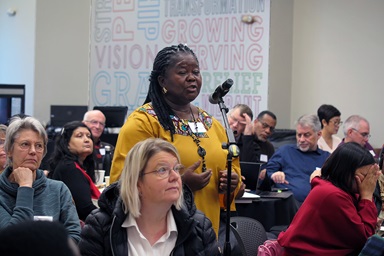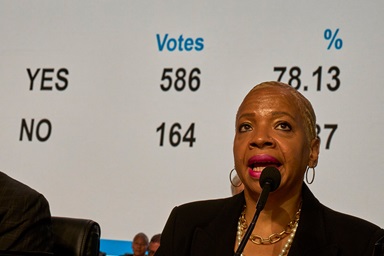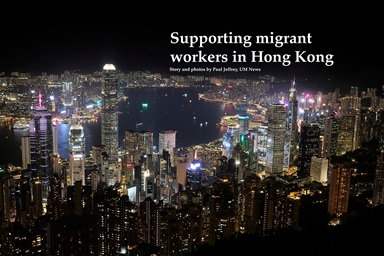Three separate gatherings were held to prepare women and youth delegates for the work at the Philippines Central Conference meeting — which includes electing bishops.
“Accountability in determining where The United Methodist Church is heading is my one great challenge as a delegate,” said Lucille Grace Hilario, a first-time lay delegate to the Philippines Central Conference meeting who attended one of the gatherings for women and youth. “The women and youth congress made me aware of my responsibility to be prepared just like a soldier armed for a battle.”
She said delegates should study the Book of Discipline and the past proceedings to prepare for the central conference gathering on Nov. 28-Dec. 4 at Aldersgate United Methodist Church in Angeles City.
All three bishops in the Philippines — Bishop Peter Torio (Baguio), Bishop Ciriaco Q. Francisco (Davao), Bishop Rodolfo Alfonso Juan (Manila) — will be running for re-election. Bishops in the Philippines face re-election every four years.
Three sessions of the congress for youth and women were held — one in Davao City on August 10-12, at Aldersgate on Sept. 23-24 and in Tarlac City on Sept. 30-Oct.1.
The congress, regularly held before the Philippines Central Conference session, is a venue for gathering, study, reflection, fellowship and orientation for all women and youth delegates.
The congress also works to achieve unity on relevant issues and concerns faced by the denomination that affect women, youth and children and enable them to lobby and advocate for relevant petitions and resolutions.
The gatherings are led and partly sponsored by the Board of Women’s Work, a program agency of the Philippines Central Conference of the United Methodist Church.
Challenges facing the church
Jennifer Ferrariza-Meneses, the board’s executive secretary, addressed the vast challenges faced by the church in the Philippines.
Issues, concerns and challenges the women and youth have identified include:
- Mission direction of the church, especially identifying relevant ministries
- Security and welfare of pastors and deaconesses, including equitable salary, health, housing, pension, counseling service for workers
- Lack of documentation for church properties
- Sexual Ethics in the church, especially sexual harassment
- Episcopal leadership
- How to strengthen prophetic witnessing.
About half of the 220 women and youth total delegates to the central conference meeting are first-time delegates.
Rio Anne Dizon, a deaconess and a principal lay delegate, was also a delegate for General Conference 2016. She is serving as a delegate to the central conference gathering for the second time. She said her experience at General Conference gave her an overview of the issues which confront the denomination.
Dizon feels that delegates have a superficial understanding on issues “because their nature and possible consequences are not cascaded down to the grass roots level which is the local church.”
“I feel that election for the episcopacy overshadowed the issues the UMC is facing,” she said.
Choosing bishops
Ferrariza- Meneses said that after the congress, women and youth committed themselves to principled voting for their chosen candidates to the episcopacy.
“Women and youth believe in the sacredness of episcopal election, thus, they believe that casting their ballots is a sacred gift and a vital part of Christian conferencing,” she said.
In exercising their power of voice and vote, she said women and youth “affirm the authority and power given to them, to be the official voice of their annual conferences and bring the voices of the churches on the ground to the highest policy-making body of the UMC in the Philippines.”
“We hope that this coming and reasoning together will once again empower and equip us as we face the challenges of our missions and ministries in our common direction of transforming our church and community through making disciples of Jesus Christ . . .” Ferrariza-Meneses said.
Hilario said the great challenge as a delegate is the knowledge of the power her voice and vote have for the future of the church.
“I pray that the Holy Spirit will empower us, for good health and wisdom to be prompt and participative in making critical decisions,” Hilario said.
Mangiduyos is a correspondent for United Methodist News Service.
News media contact: Vicki Brown, news editor, [email protected] or 615-742-5470.
Like what you're reading? Support the ministry of UM News! Your support ensures the latest denominational news, dynamic stories and informative articles will continue to connect our global community. Make a tax-deductible donation at ResourceUMC.org/GiveUMCom.




